Entrepreneurship and Small Business Management : Solved Assignment PDF
VerifiedAdded on 2021/02/20
|13
|3409
|73
AI Summary
Contribute Materials
Your contribution can guide someone’s learning journey. Share your
documents today.

ENTREPRENEURSHIP
AND SMALL
BUSINESS
MANAGEMENT
AND SMALL
BUSINESS
MANAGEMENT
Secure Best Marks with AI Grader
Need help grading? Try our AI Grader for instant feedback on your assignments.

Table of Contents
INTRODUCTION...........................................................................................................................1
TASK 1............................................................................................................................................1
P1 Different type of entrepreneurial ventures and their relation to the typology of
entrepreneurship.....................................................................................................................1
P2 Similarities and difference between entrepreneurial ventures..........................................3
TASK 2............................................................................................................................................4
P4. Micro and small businesses impact on economy.............................................................4
TASK 2 (LO2 & LO3).....................................................................................................................7
[Covered in PPT]....................................................................................................................7
CONCLUSION................................................................................................................................7
REFERENCES................................................................................................................................9
REFERENCE.................................................................................................................................11
INTRODUCTION...........................................................................................................................1
TASK 1............................................................................................................................................1
P1 Different type of entrepreneurial ventures and their relation to the typology of
entrepreneurship.....................................................................................................................1
P2 Similarities and difference between entrepreneurial ventures..........................................3
TASK 2............................................................................................................................................4
P4. Micro and small businesses impact on economy.............................................................4
TASK 2 (LO2 & LO3).....................................................................................................................7
[Covered in PPT]....................................................................................................................7
CONCLUSION................................................................................................................................7
REFERENCES................................................................................................................................9
REFERENCE.................................................................................................................................11
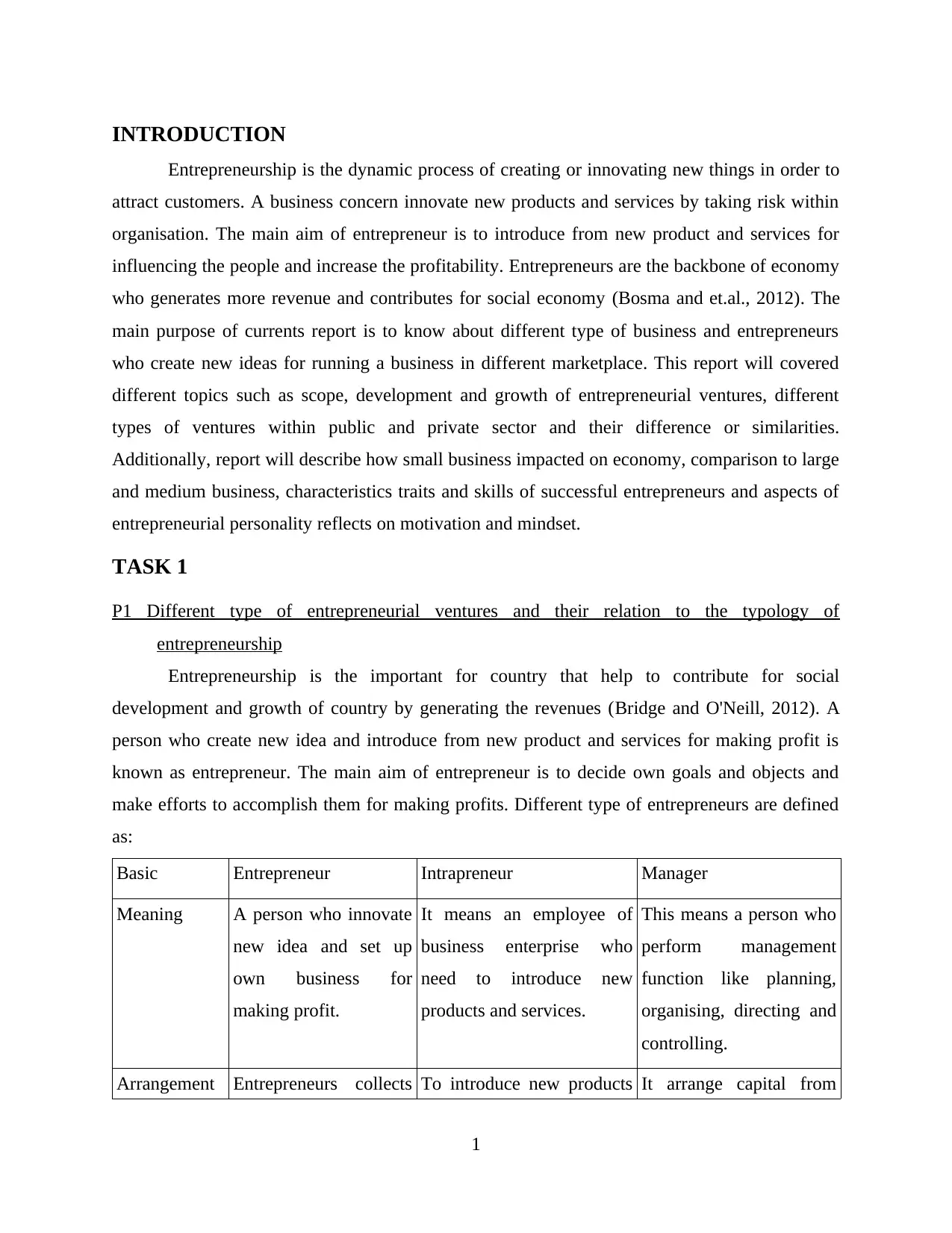
INTRODUCTION
Entrepreneurship is the dynamic process of creating or innovating new things in order to
attract customers. A business concern innovate new products and services by taking risk within
organisation. The main aim of entrepreneur is to introduce from new product and services for
influencing the people and increase the profitability. Entrepreneurs are the backbone of economy
who generates more revenue and contributes for social economy (Bosma and et.al., 2012). The
main purpose of currents report is to know about different type of business and entrepreneurs
who create new ideas for running a business in different marketplace. This report will covered
different topics such as scope, development and growth of entrepreneurial ventures, different
types of ventures within public and private sector and their difference or similarities.
Additionally, report will describe how small business impacted on economy, comparison to large
and medium business, characteristics traits and skills of successful entrepreneurs and aspects of
entrepreneurial personality reflects on motivation and mindset.
TASK 1
P1 Different type of entrepreneurial ventures and their relation to the typology of
entrepreneurship
Entrepreneurship is the important for country that help to contribute for social
development and growth of country by generating the revenues (Bridge and O'Neill, 2012). A
person who create new idea and introduce from new product and services for making profit is
known as entrepreneur. The main aim of entrepreneur is to decide own goals and objects and
make efforts to accomplish them for making profits. Different type of entrepreneurs are defined
as:
Basic Entrepreneur Intrapreneur Manager
Meaning A person who innovate
new idea and set up
own business for
making profit.
It means an employee of
business enterprise who
need to introduce new
products and services.
This means a person who
perform management
function like planning,
organising, directing and
controlling.
Arrangement Entrepreneurs collects To introduce new products It arrange capital from
1
Entrepreneurship is the dynamic process of creating or innovating new things in order to
attract customers. A business concern innovate new products and services by taking risk within
organisation. The main aim of entrepreneur is to introduce from new product and services for
influencing the people and increase the profitability. Entrepreneurs are the backbone of economy
who generates more revenue and contributes for social economy (Bosma and et.al., 2012). The
main purpose of currents report is to know about different type of business and entrepreneurs
who create new ideas for running a business in different marketplace. This report will covered
different topics such as scope, development and growth of entrepreneurial ventures, different
types of ventures within public and private sector and their difference or similarities.
Additionally, report will describe how small business impacted on economy, comparison to large
and medium business, characteristics traits and skills of successful entrepreneurs and aspects of
entrepreneurial personality reflects on motivation and mindset.
TASK 1
P1 Different type of entrepreneurial ventures and their relation to the typology of
entrepreneurship
Entrepreneurship is the important for country that help to contribute for social
development and growth of country by generating the revenues (Bridge and O'Neill, 2012). A
person who create new idea and introduce from new product and services for making profit is
known as entrepreneur. The main aim of entrepreneur is to decide own goals and objects and
make efforts to accomplish them for making profits. Different type of entrepreneurs are defined
as:
Basic Entrepreneur Intrapreneur Manager
Meaning A person who innovate
new idea and set up
own business for
making profit.
It means an employee of
business enterprise who
need to introduce new
products and services.
This means a person who
perform management
function like planning,
organising, directing and
controlling.
Arrangement Entrepreneurs collects To introduce new products It arrange capital from
1
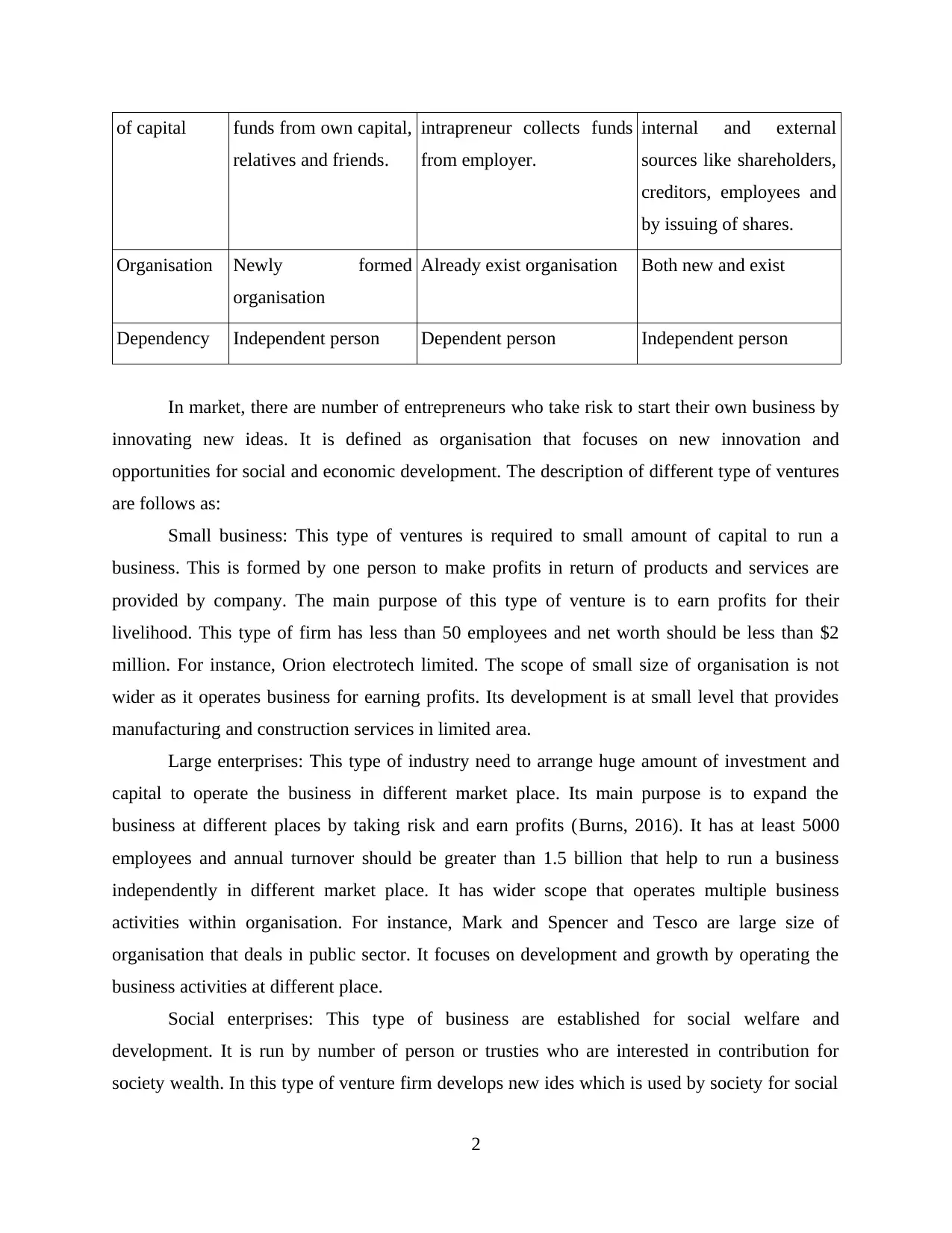
of capital funds from own capital,
relatives and friends.
intrapreneur collects funds
from employer.
internal and external
sources like shareholders,
creditors, employees and
by issuing of shares.
Organisation Newly formed
organisation
Already exist organisation Both new and exist
Dependency Independent person Dependent person Independent person
In market, there are number of entrepreneurs who take risk to start their own business by
innovating new ideas. It is defined as organisation that focuses on new innovation and
opportunities for social and economic development. The description of different type of ventures
are follows as:
Small business: This type of ventures is required to small amount of capital to run a
business. This is formed by one person to make profits in return of products and services are
provided by company. The main purpose of this type of venture is to earn profits for their
livelihood. This type of firm has less than 50 employees and net worth should be less than $2
million. For instance, Orion electrotech limited. The scope of small size of organisation is not
wider as it operates business for earning profits. Its development is at small level that provides
manufacturing and construction services in limited area.
Large enterprises: This type of industry need to arrange huge amount of investment and
capital to operate the business in different market place. Its main purpose is to expand the
business at different places by taking risk and earn profits (Burns, 2016). It has at least 5000
employees and annual turnover should be greater than 1.5 billion that help to run a business
independently in different market place. It has wider scope that operates multiple business
activities within organisation. For instance, Mark and Spencer and Tesco are large size of
organisation that deals in public sector. It focuses on development and growth by operating the
business activities at different place.
Social enterprises: This type of business are established for social welfare and
development. It is run by number of person or trusties who are interested in contribution for
society wealth. In this type of venture firm develops new ides which is used by society for social
2
relatives and friends.
intrapreneur collects funds
from employer.
internal and external
sources like shareholders,
creditors, employees and
by issuing of shares.
Organisation Newly formed
organisation
Already exist organisation Both new and exist
Dependency Independent person Dependent person Independent person
In market, there are number of entrepreneurs who take risk to start their own business by
innovating new ideas. It is defined as organisation that focuses on new innovation and
opportunities for social and economic development. The description of different type of ventures
are follows as:
Small business: This type of ventures is required to small amount of capital to run a
business. This is formed by one person to make profits in return of products and services are
provided by company. The main purpose of this type of venture is to earn profits for their
livelihood. This type of firm has less than 50 employees and net worth should be less than $2
million. For instance, Orion electrotech limited. The scope of small size of organisation is not
wider as it operates business for earning profits. Its development is at small level that provides
manufacturing and construction services in limited area.
Large enterprises: This type of industry need to arrange huge amount of investment and
capital to operate the business in different market place. Its main purpose is to expand the
business at different places by taking risk and earn profits (Burns, 2016). It has at least 5000
employees and annual turnover should be greater than 1.5 billion that help to run a business
independently in different market place. It has wider scope that operates multiple business
activities within organisation. For instance, Mark and Spencer and Tesco are large size of
organisation that deals in public sector. It focuses on development and growth by operating the
business activities at different place.
Social enterprises: This type of business are established for social welfare and
development. It is run by number of person or trusties who are interested in contribution for
society wealth. In this type of venture firm develops new ides which is used by society for social
2
Secure Best Marks with AI Grader
Need help grading? Try our AI Grader for instant feedback on your assignments.
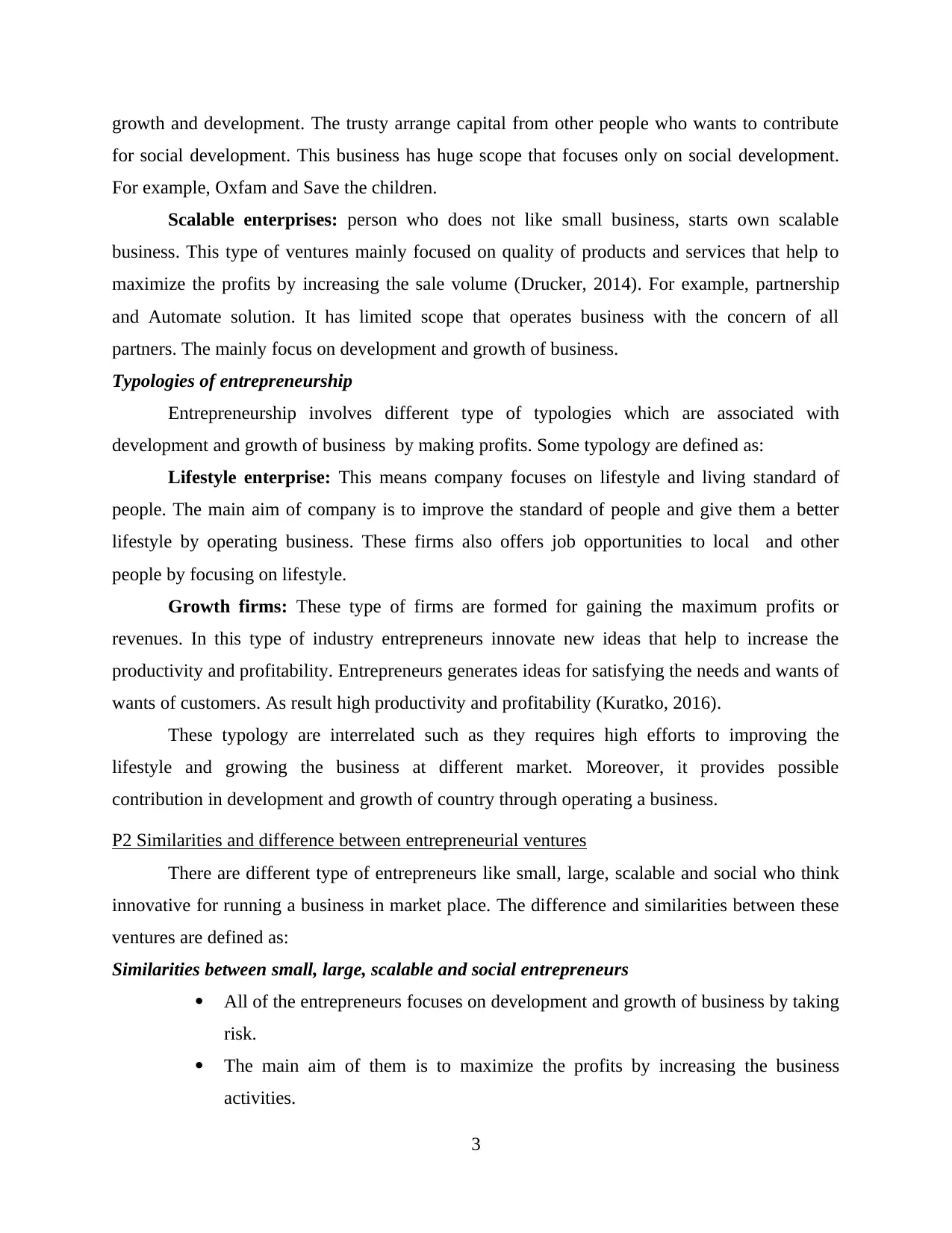
growth and development. The trusty arrange capital from other people who wants to contribute
for social development. This business has huge scope that focuses only on social development.
For example, Oxfam and Save the children.
Scalable enterprises: person who does not like small business, starts own scalable
business. This type of ventures mainly focused on quality of products and services that help to
maximize the profits by increasing the sale volume (Drucker, 2014). For example, partnership
and Automate solution. It has limited scope that operates business with the concern of all
partners. The mainly focus on development and growth of business.
Typologies of entrepreneurship
Entrepreneurship involves different type of typologies which are associated with
development and growth of business by making profits. Some typology are defined as:
Lifestyle enterprise: This means company focuses on lifestyle and living standard of
people. The main aim of company is to improve the standard of people and give them a better
lifestyle by operating business. These firms also offers job opportunities to local and other
people by focusing on lifestyle.
Growth firms: These type of firms are formed for gaining the maximum profits or
revenues. In this type of industry entrepreneurs innovate new ideas that help to increase the
productivity and profitability. Entrepreneurs generates ideas for satisfying the needs and wants of
wants of customers. As result high productivity and profitability (Kuratko, 2016).
These typology are interrelated such as they requires high efforts to improving the
lifestyle and growing the business at different market. Moreover, it provides possible
contribution in development and growth of country through operating a business.
P2 Similarities and difference between entrepreneurial ventures
There are different type of entrepreneurs like small, large, scalable and social who think
innovative for running a business in market place. The difference and similarities between these
ventures are defined as:
Similarities between small, large, scalable and social entrepreneurs
All of the entrepreneurs focuses on development and growth of business by taking
risk.
The main aim of them is to maximize the profits by increasing the business
activities.
3
for social development. This business has huge scope that focuses only on social development.
For example, Oxfam and Save the children.
Scalable enterprises: person who does not like small business, starts own scalable
business. This type of ventures mainly focused on quality of products and services that help to
maximize the profits by increasing the sale volume (Drucker, 2014). For example, partnership
and Automate solution. It has limited scope that operates business with the concern of all
partners. The mainly focus on development and growth of business.
Typologies of entrepreneurship
Entrepreneurship involves different type of typologies which are associated with
development and growth of business by making profits. Some typology are defined as:
Lifestyle enterprise: This means company focuses on lifestyle and living standard of
people. The main aim of company is to improve the standard of people and give them a better
lifestyle by operating business. These firms also offers job opportunities to local and other
people by focusing on lifestyle.
Growth firms: These type of firms are formed for gaining the maximum profits or
revenues. In this type of industry entrepreneurs innovate new ideas that help to increase the
productivity and profitability. Entrepreneurs generates ideas for satisfying the needs and wants of
wants of customers. As result high productivity and profitability (Kuratko, 2016).
These typology are interrelated such as they requires high efforts to improving the
lifestyle and growing the business at different market. Moreover, it provides possible
contribution in development and growth of country through operating a business.
P2 Similarities and difference between entrepreneurial ventures
There are different type of entrepreneurs like small, large, scalable and social who think
innovative for running a business in market place. The difference and similarities between these
ventures are defined as:
Similarities between small, large, scalable and social entrepreneurs
All of the entrepreneurs focuses on development and growth of business by taking
risk.
The main aim of them is to maximize the profits by increasing the business
activities.
3
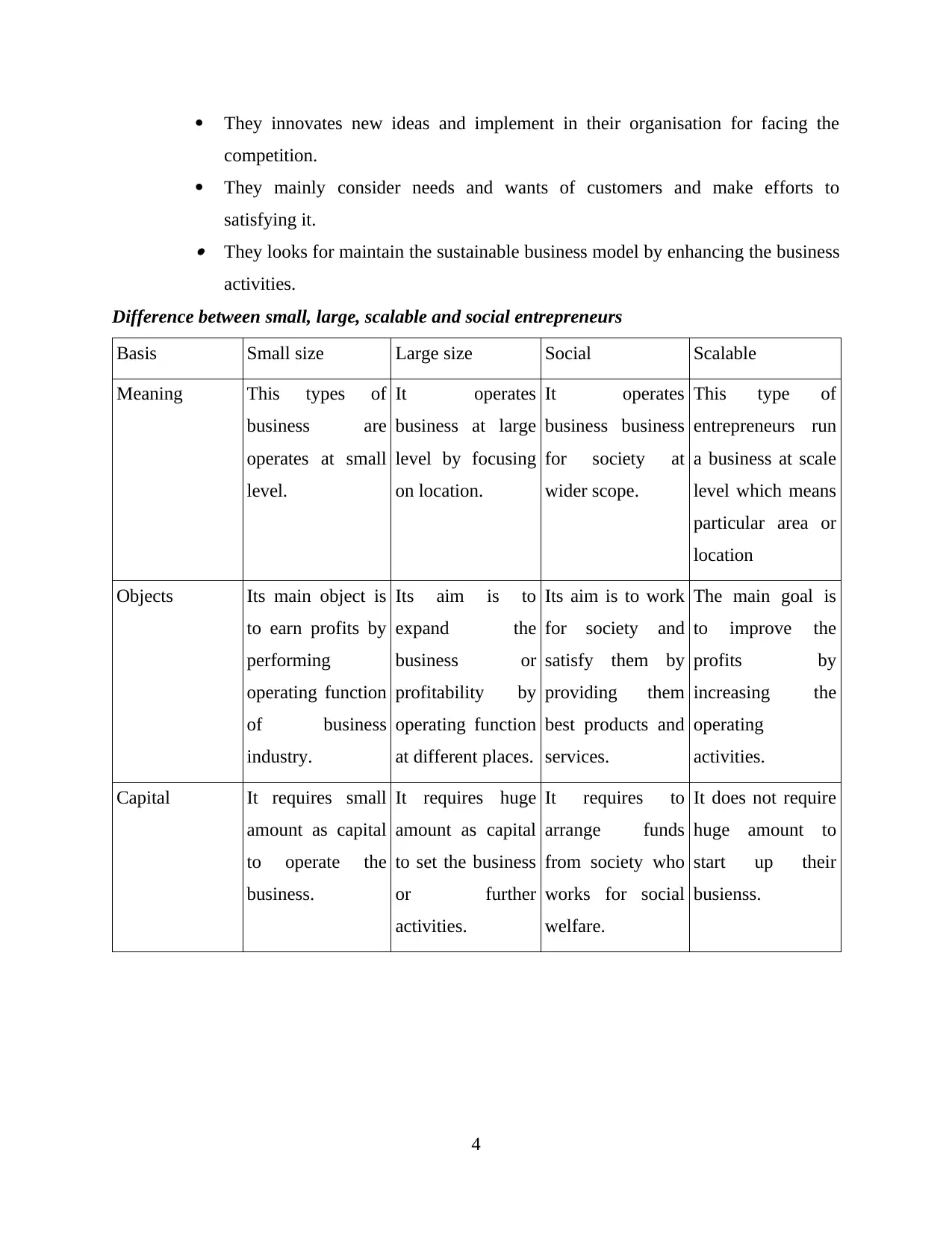
They innovates new ideas and implement in their organisation for facing the
competition.
They mainly consider needs and wants of customers and make efforts to
satisfying it.
They looks for maintain the sustainable business model by enhancing the business
activities.
Difference between small, large, scalable and social entrepreneurs
Basis Small size Large size Social Scalable
Meaning This types of
business are
operates at small
level.
It operates
business at large
level by focusing
on location.
It operates
business business
for society at
wider scope.
This type of
entrepreneurs run
a business at scale
level which means
particular area or
location
Objects Its main object is
to earn profits by
performing
operating function
of business
industry.
Its aim is to
expand the
business or
profitability by
operating function
at different places.
Its aim is to work
for society and
satisfy them by
providing them
best products and
services.
The main goal is
to improve the
profits by
increasing the
operating
activities.
Capital It requires small
amount as capital
to operate the
business.
It requires huge
amount as capital
to set the business
or further
activities.
It requires to
arrange funds
from society who
works for social
welfare.
It does not require
huge amount to
start up their
busienss.
4
competition.
They mainly consider needs and wants of customers and make efforts to
satisfying it.
They looks for maintain the sustainable business model by enhancing the business
activities.
Difference between small, large, scalable and social entrepreneurs
Basis Small size Large size Social Scalable
Meaning This types of
business are
operates at small
level.
It operates
business at large
level by focusing
on location.
It operates
business business
for society at
wider scope.
This type of
entrepreneurs run
a business at scale
level which means
particular area or
location
Objects Its main object is
to earn profits by
performing
operating function
of business
industry.
Its aim is to
expand the
business or
profitability by
operating function
at different places.
Its aim is to work
for society and
satisfy them by
providing them
best products and
services.
The main goal is
to improve the
profits by
increasing the
operating
activities.
Capital It requires small
amount as capital
to operate the
business.
It requires huge
amount as capital
to set the business
or further
activities.
It requires to
arrange funds
from society who
works for social
welfare.
It does not require
huge amount to
start up their
busienss.
4
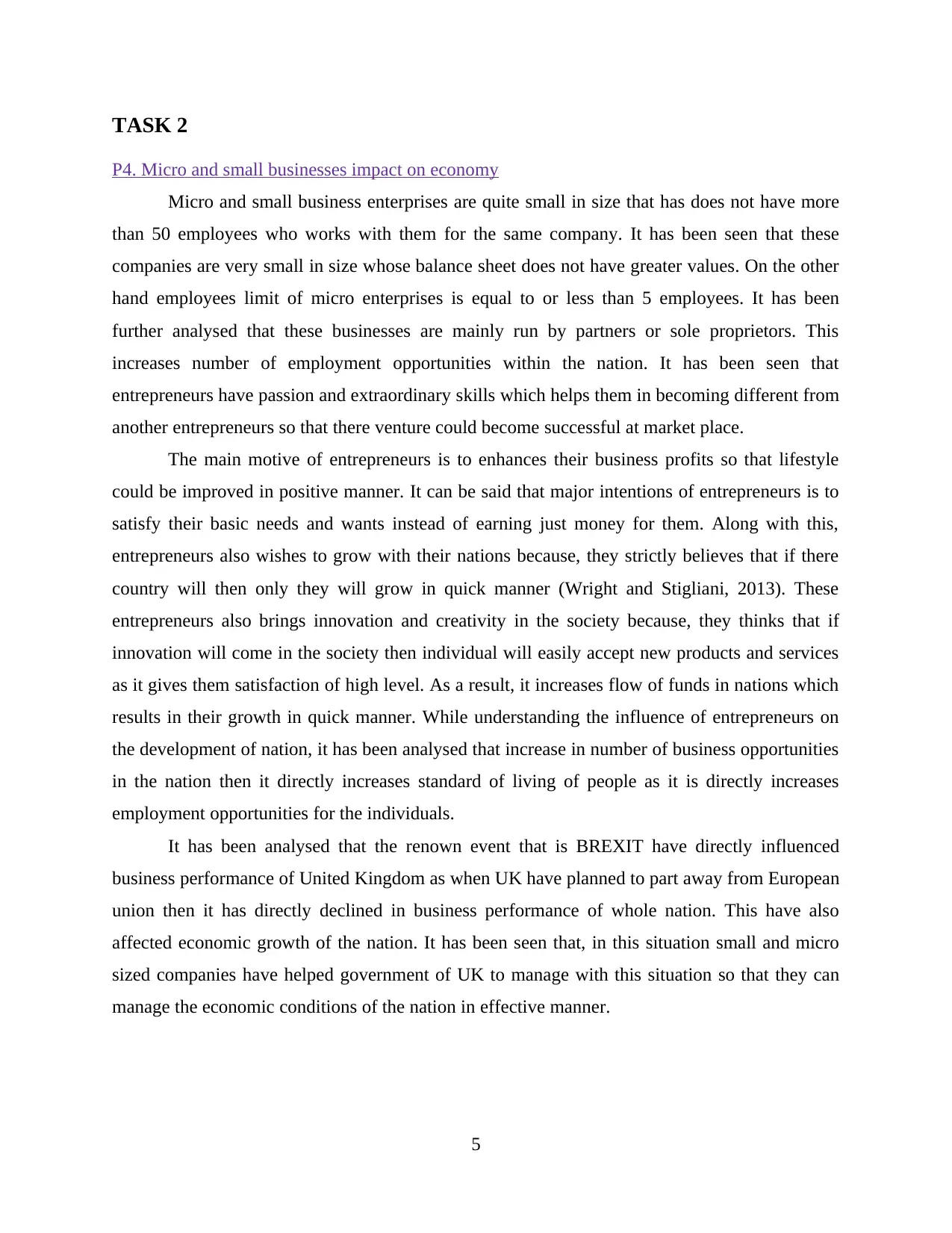
TASK 2
P4. Micro and small businesses impact on economy
Micro and small business enterprises are quite small in size that has does not have more
than 50 employees who works with them for the same company. It has been seen that these
companies are very small in size whose balance sheet does not have greater values. On the other
hand employees limit of micro enterprises is equal to or less than 5 employees. It has been
further analysed that these businesses are mainly run by partners or sole proprietors. This
increases number of employment opportunities within the nation. It has been seen that
entrepreneurs have passion and extraordinary skills which helps them in becoming different from
another entrepreneurs so that there venture could become successful at market place.
The main motive of entrepreneurs is to enhances their business profits so that lifestyle
could be improved in positive manner. It can be said that major intentions of entrepreneurs is to
satisfy their basic needs and wants instead of earning just money for them. Along with this,
entrepreneurs also wishes to grow with their nations because, they strictly believes that if there
country will then only they will grow in quick manner (Wright and Stigliani, 2013). These
entrepreneurs also brings innovation and creativity in the society because, they thinks that if
innovation will come in the society then individual will easily accept new products and services
as it gives them satisfaction of high level. As a result, it increases flow of funds in nations which
results in their growth in quick manner. While understanding the influence of entrepreneurs on
the development of nation, it has been analysed that increase in number of business opportunities
in the nation then it directly increases standard of living of people as it is directly increases
employment opportunities for the individuals.
It has been analysed that the renown event that is BREXIT have directly influenced
business performance of United Kingdom as when UK have planned to part away from European
union then it has directly declined in business performance of whole nation. This have also
affected economic growth of the nation. It has been seen that, in this situation small and micro
sized companies have helped government of UK to manage with this situation so that they can
manage the economic conditions of the nation in effective manner.
5
P4. Micro and small businesses impact on economy
Micro and small business enterprises are quite small in size that has does not have more
than 50 employees who works with them for the same company. It has been seen that these
companies are very small in size whose balance sheet does not have greater values. On the other
hand employees limit of micro enterprises is equal to or less than 5 employees. It has been
further analysed that these businesses are mainly run by partners or sole proprietors. This
increases number of employment opportunities within the nation. It has been seen that
entrepreneurs have passion and extraordinary skills which helps them in becoming different from
another entrepreneurs so that there venture could become successful at market place.
The main motive of entrepreneurs is to enhances their business profits so that lifestyle
could be improved in positive manner. It can be said that major intentions of entrepreneurs is to
satisfy their basic needs and wants instead of earning just money for them. Along with this,
entrepreneurs also wishes to grow with their nations because, they strictly believes that if there
country will then only they will grow in quick manner (Wright and Stigliani, 2013). These
entrepreneurs also brings innovation and creativity in the society because, they thinks that if
innovation will come in the society then individual will easily accept new products and services
as it gives them satisfaction of high level. As a result, it increases flow of funds in nations which
results in their growth in quick manner. While understanding the influence of entrepreneurs on
the development of nation, it has been analysed that increase in number of business opportunities
in the nation then it directly increases standard of living of people as it is directly increases
employment opportunities for the individuals.
It has been analysed that the renown event that is BREXIT have directly influenced
business performance of United Kingdom as when UK have planned to part away from European
union then it has directly declined in business performance of whole nation. This have also
affected economic growth of the nation. It has been seen that, in this situation small and micro
sized companies have helped government of UK to manage with this situation so that they can
manage the economic conditions of the nation in effective manner.
5
Paraphrase This Document
Need a fresh take? Get an instant paraphrase of this document with our AI Paraphraser
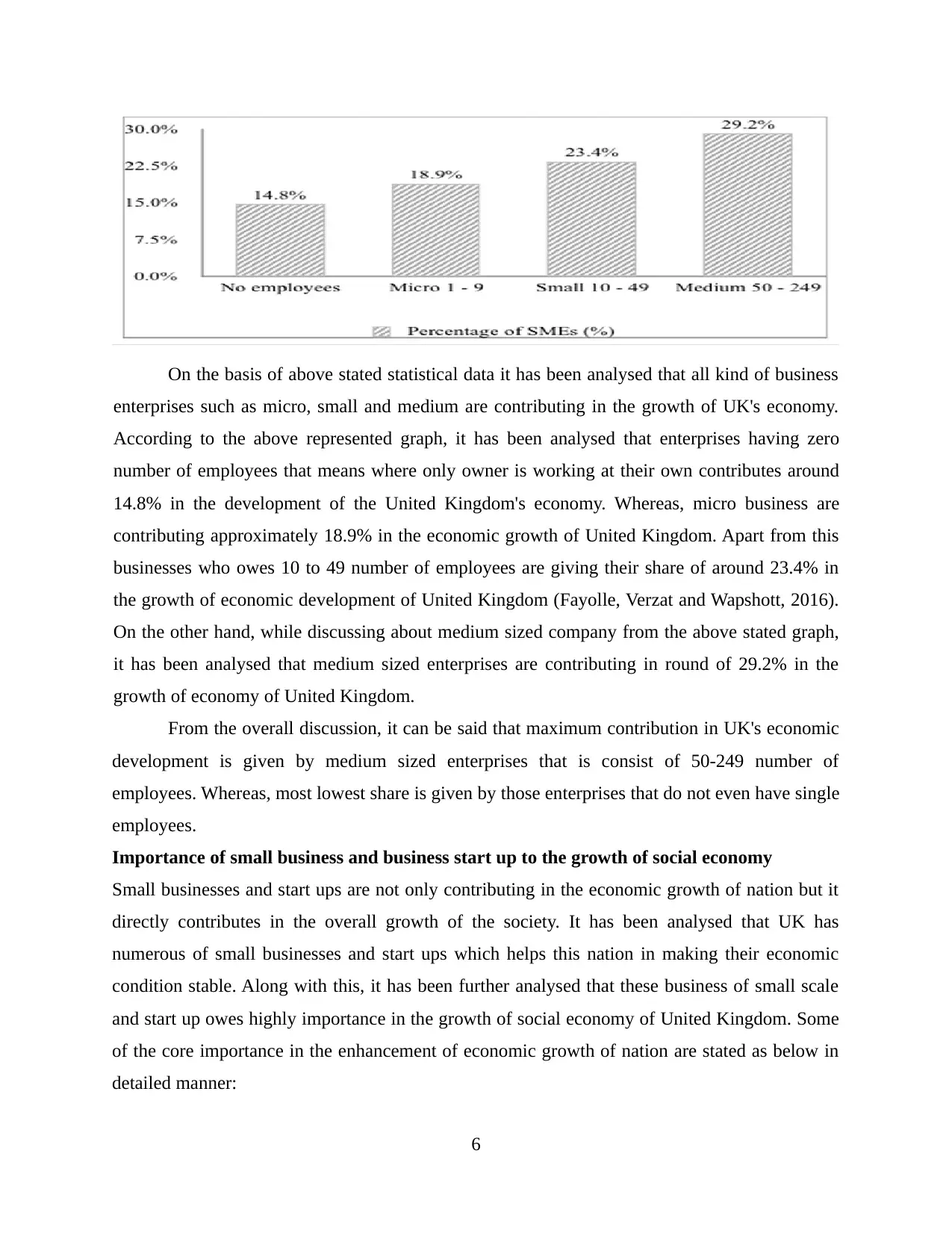
On the basis of above stated statistical data it has been analysed that all kind of business
enterprises such as micro, small and medium are contributing in the growth of UK's economy.
According to the above represented graph, it has been analysed that enterprises having zero
number of employees that means where only owner is working at their own contributes around
14.8% in the development of the United Kingdom's economy. Whereas, micro business are
contributing approximately 18.9% in the economic growth of United Kingdom. Apart from this
businesses who owes 10 to 49 number of employees are giving their share of around 23.4% in
the growth of economic development of United Kingdom (Fayolle, Verzat and Wapshott, 2016).
On the other hand, while discussing about medium sized company from the above stated graph,
it has been analysed that medium sized enterprises are contributing in round of 29.2% in the
growth of economy of United Kingdom.
From the overall discussion, it can be said that maximum contribution in UK's economic
development is given by medium sized enterprises that is consist of 50-249 number of
employees. Whereas, most lowest share is given by those enterprises that do not even have single
employees.
Importance of small business and business start up to the growth of social economy
Small businesses and start ups are not only contributing in the economic growth of nation but it
directly contributes in the overall growth of the society. It has been analysed that UK has
numerous of small businesses and start ups which helps this nation in making their economic
condition stable. Along with this, it has been further analysed that these business of small scale
and start up owes highly importance in the growth of social economy of United Kingdom. Some
of the core importance in the enhancement of economic growth of nation are stated as below in
detailed manner:
6
enterprises such as micro, small and medium are contributing in the growth of UK's economy.
According to the above represented graph, it has been analysed that enterprises having zero
number of employees that means where only owner is working at their own contributes around
14.8% in the development of the United Kingdom's economy. Whereas, micro business are
contributing approximately 18.9% in the economic growth of United Kingdom. Apart from this
businesses who owes 10 to 49 number of employees are giving their share of around 23.4% in
the growth of economic development of United Kingdom (Fayolle, Verzat and Wapshott, 2016).
On the other hand, while discussing about medium sized company from the above stated graph,
it has been analysed that medium sized enterprises are contributing in round of 29.2% in the
growth of economy of United Kingdom.
From the overall discussion, it can be said that maximum contribution in UK's economic
development is given by medium sized enterprises that is consist of 50-249 number of
employees. Whereas, most lowest share is given by those enterprises that do not even have single
employees.
Importance of small business and business start up to the growth of social economy
Small businesses and start ups are not only contributing in the economic growth of nation but it
directly contributes in the overall growth of the society. It has been analysed that UK has
numerous of small businesses and start ups which helps this nation in making their economic
condition stable. Along with this, it has been further analysed that these business of small scale
and start up owes highly importance in the growth of social economy of United Kingdom. Some
of the core importance in the enhancement of economic growth of nation are stated as below in
detailed manner:
6
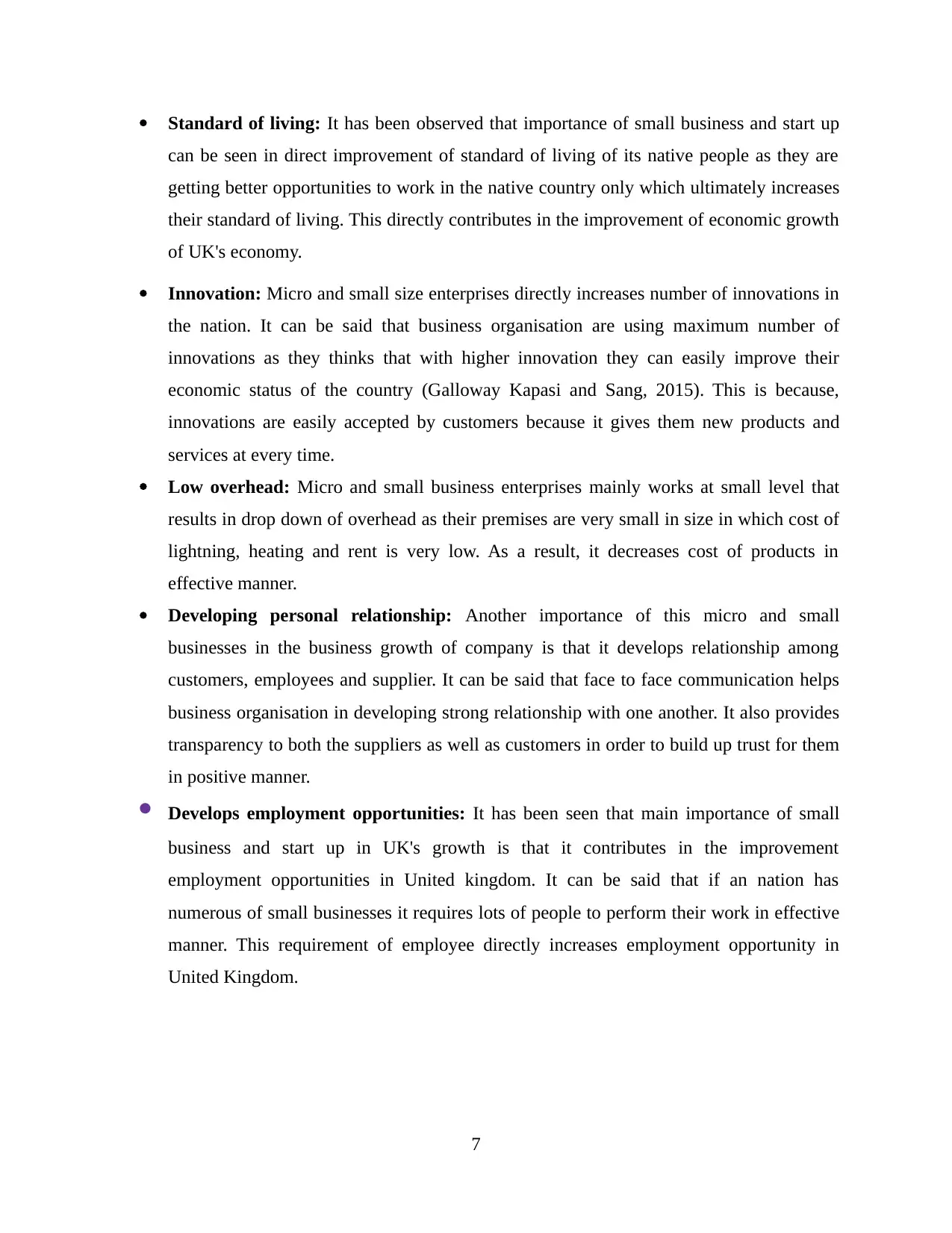
Standard of living: It has been observed that importance of small business and start up
can be seen in direct improvement of standard of living of its native people as they are
getting better opportunities to work in the native country only which ultimately increases
their standard of living. This directly contributes in the improvement of economic growth
of UK's economy.
Innovation: Micro and small size enterprises directly increases number of innovations in
the nation. It can be said that business organisation are using maximum number of
innovations as they thinks that with higher innovation they can easily improve their
economic status of the country (Galloway Kapasi and Sang, 2015). This is because,
innovations are easily accepted by customers because it gives them new products and
services at every time.
Low overhead: Micro and small business enterprises mainly works at small level that
results in drop down of overhead as their premises are very small in size in which cost of
lightning, heating and rent is very low. As a result, it decreases cost of products in
effective manner.
Developing personal relationship: Another importance of this micro and small
businesses in the business growth of company is that it develops relationship among
customers, employees and supplier. It can be said that face to face communication helps
business organisation in developing strong relationship with one another. It also provides
transparency to both the suppliers as well as customers in order to build up trust for them
in positive manner.
Develops employment opportunities: It has been seen that main importance of small
business and start up in UK's growth is that it contributes in the improvement
employment opportunities in United kingdom. It can be said that if an nation has
numerous of small businesses it requires lots of people to perform their work in effective
manner. This requirement of employee directly increases employment opportunity in
United Kingdom.
7
can be seen in direct improvement of standard of living of its native people as they are
getting better opportunities to work in the native country only which ultimately increases
their standard of living. This directly contributes in the improvement of economic growth
of UK's economy.
Innovation: Micro and small size enterprises directly increases number of innovations in
the nation. It can be said that business organisation are using maximum number of
innovations as they thinks that with higher innovation they can easily improve their
economic status of the country (Galloway Kapasi and Sang, 2015). This is because,
innovations are easily accepted by customers because it gives them new products and
services at every time.
Low overhead: Micro and small business enterprises mainly works at small level that
results in drop down of overhead as their premises are very small in size in which cost of
lightning, heating and rent is very low. As a result, it decreases cost of products in
effective manner.
Developing personal relationship: Another importance of this micro and small
businesses in the business growth of company is that it develops relationship among
customers, employees and supplier. It can be said that face to face communication helps
business organisation in developing strong relationship with one another. It also provides
transparency to both the suppliers as well as customers in order to build up trust for them
in positive manner.
Develops employment opportunities: It has been seen that main importance of small
business and start up in UK's growth is that it contributes in the improvement
employment opportunities in United kingdom. It can be said that if an nation has
numerous of small businesses it requires lots of people to perform their work in effective
manner. This requirement of employee directly increases employment opportunity in
United Kingdom.
7
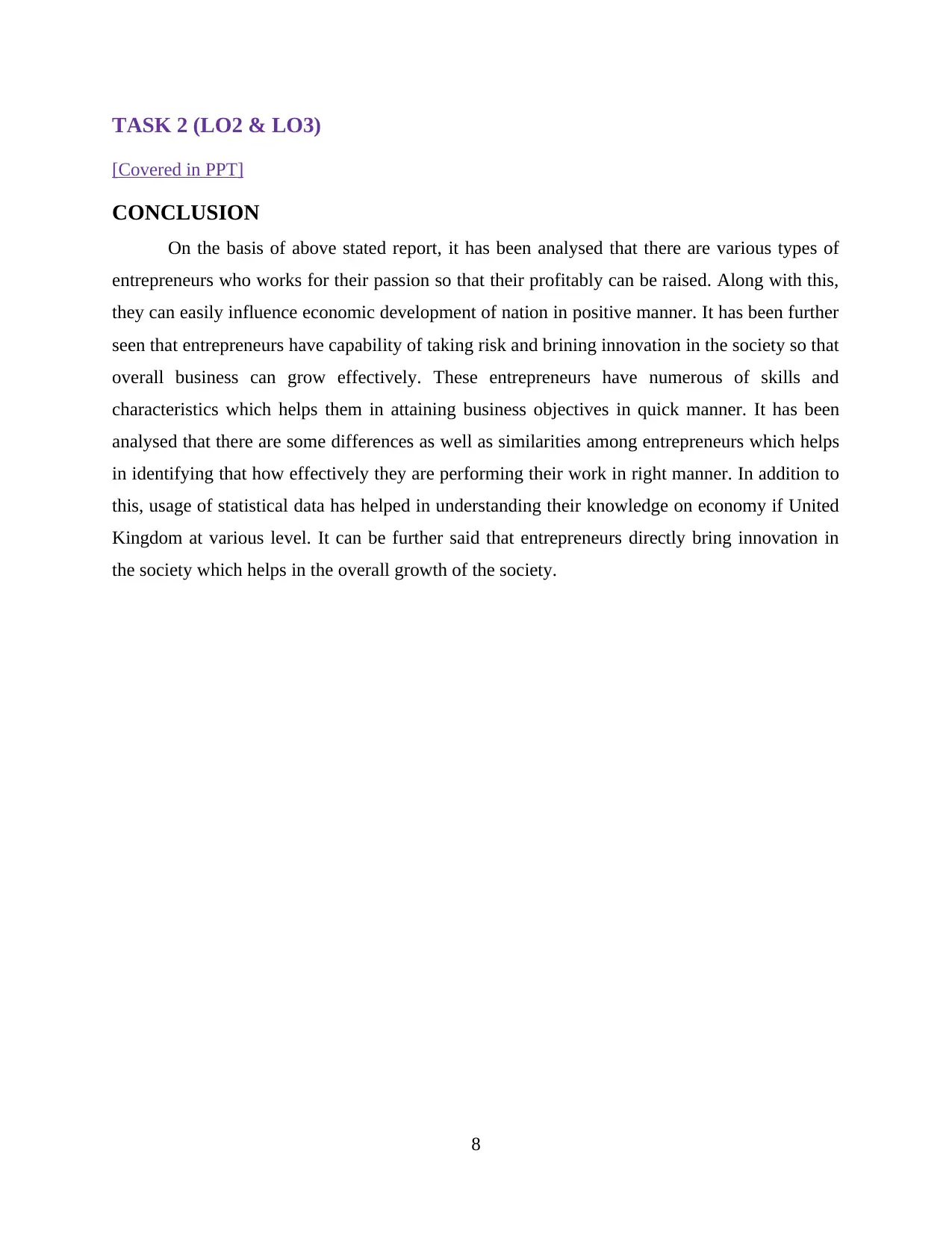
TASK 2 (LO2 & LO3)
[Covered in PPT]
CONCLUSION
On the basis of above stated report, it has been analysed that there are various types of
entrepreneurs who works for their passion so that their profitably can be raised. Along with this,
they can easily influence economic development of nation in positive manner. It has been further
seen that entrepreneurs have capability of taking risk and brining innovation in the society so that
overall business can grow effectively. These entrepreneurs have numerous of skills and
characteristics which helps them in attaining business objectives in quick manner. It has been
analysed that there are some differences as well as similarities among entrepreneurs which helps
in identifying that how effectively they are performing their work in right manner. In addition to
this, usage of statistical data has helped in understanding their knowledge on economy if United
Kingdom at various level. It can be further said that entrepreneurs directly bring innovation in
the society which helps in the overall growth of the society.
8
[Covered in PPT]
CONCLUSION
On the basis of above stated report, it has been analysed that there are various types of
entrepreneurs who works for their passion so that their profitably can be raised. Along with this,
they can easily influence economic development of nation in positive manner. It has been further
seen that entrepreneurs have capability of taking risk and brining innovation in the society so that
overall business can grow effectively. These entrepreneurs have numerous of skills and
characteristics which helps them in attaining business objectives in quick manner. It has been
analysed that there are some differences as well as similarities among entrepreneurs which helps
in identifying that how effectively they are performing their work in right manner. In addition to
this, usage of statistical data has helped in understanding their knowledge on economy if United
Kingdom at various level. It can be further said that entrepreneurs directly bring innovation in
the society which helps in the overall growth of the society.
8
Secure Best Marks with AI Grader
Need help grading? Try our AI Grader for instant feedback on your assignments.
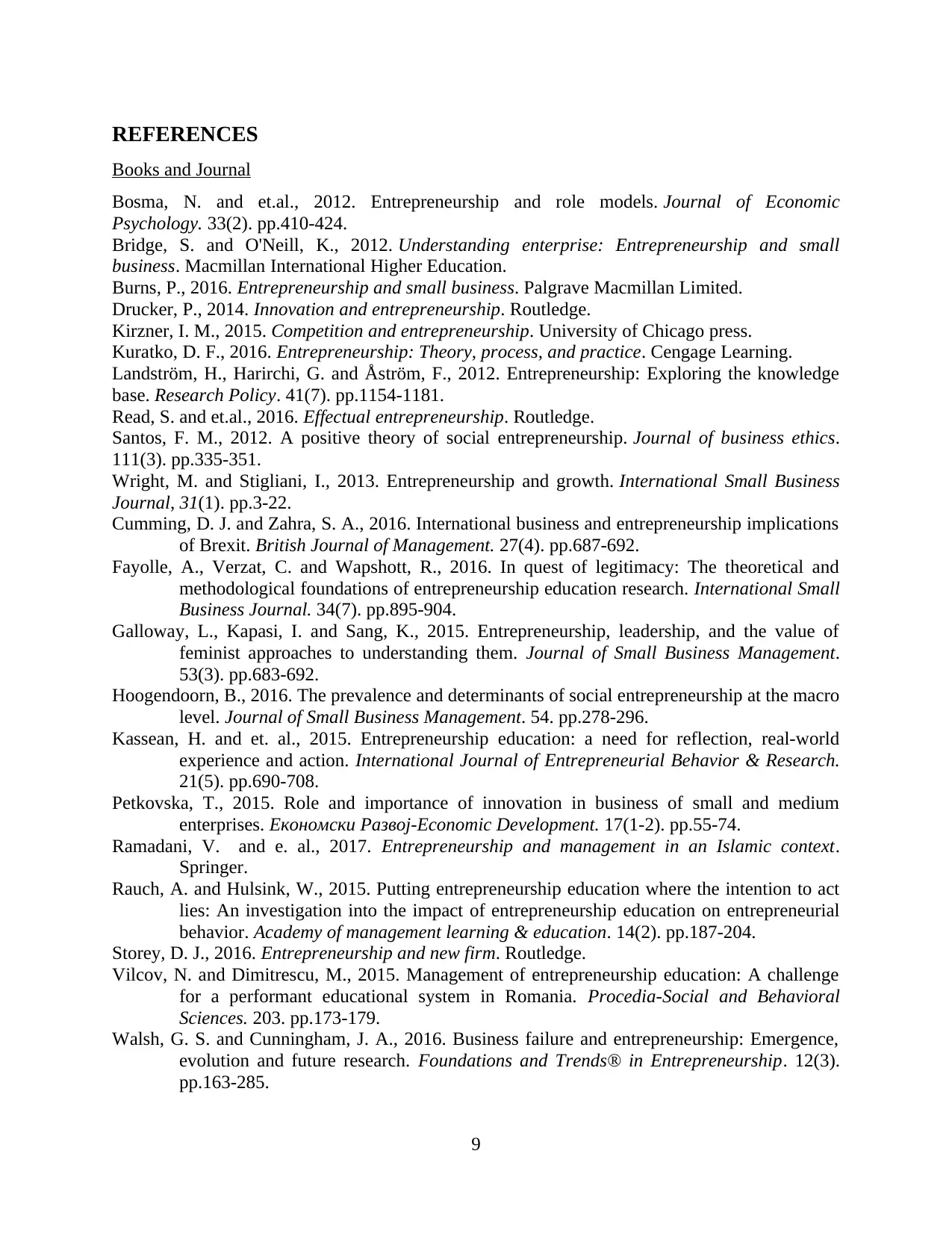
REFERENCES
Books and Journal
Bosma, N. and et.al., 2012. Entrepreneurship and role models. Journal of Economic
Psychology. 33(2). pp.410-424.
Bridge, S. and O'Neill, K., 2012. Understanding enterprise: Entrepreneurship and small
business. Macmillan International Higher Education.
Burns, P., 2016. Entrepreneurship and small business. Palgrave Macmillan Limited.
Drucker, P., 2014. Innovation and entrepreneurship. Routledge.
Kirzner, I. M., 2015. Competition and entrepreneurship. University of Chicago press.
Kuratko, D. F., 2016. Entrepreneurship: Theory, process, and practice. Cengage Learning.
Landström, H., Harirchi, G. and Åström, F., 2012. Entrepreneurship: Exploring the knowledge
base. Research Policy. 41(7). pp.1154-1181.
Read, S. and et.al., 2016. Effectual entrepreneurship. Routledge.
Santos, F. M., 2012. A positive theory of social entrepreneurship. Journal of business ethics.
111(3). pp.335-351.
Wright, M. and Stigliani, I., 2013. Entrepreneurship and growth. International Small Business
Journal, 31(1). pp.3-22.
Cumming, D. J. and Zahra, S. A., 2016. International business and entrepreneurship implications
of Brexit. British Journal of Management. 27(4). pp.687-692.
Fayolle, A., Verzat, C. and Wapshott, R., 2016. In quest of legitimacy: The theoretical and
methodological foundations of entrepreneurship education research. International Small
Business Journal. 34(7). pp.895-904.
Galloway, L., Kapasi, I. and Sang, K., 2015. Entrepreneurship, leadership, and the value of
feminist approaches to understanding them. Journal of Small Business Management.
53(3). pp.683-692.
Hoogendoorn, B., 2016. The prevalence and determinants of social entrepreneurship at the macro
level. Journal of Small Business Management. 54. pp.278-296.
Kassean, H. and et. al., 2015. Entrepreneurship education: a need for reflection, real-world
experience and action. International Journal of Entrepreneurial Behavior & Research.
21(5). pp.690-708.
Petkovska, T., 2015. Role and importance of innovation in business of small and medium
enterprises. Економски Развој-Economic Development. 17(1-2). pp.55-74.
Ramadani, V. and e. al., 2017. Entrepreneurship and management in an Islamic context.
Springer.
Rauch, A. and Hulsink, W., 2015. Putting entrepreneurship education where the intention to act
lies: An investigation into the impact of entrepreneurship education on entrepreneurial
behavior. Academy of management learning & education. 14(2). pp.187-204.
Storey, D. J., 2016. Entrepreneurship and new firm. Routledge.
Vilcov, N. and Dimitrescu, M., 2015. Management of entrepreneurship education: A challenge
for a performant educational system in Romania. Procedia-Social and Behavioral
Sciences. 203. pp.173-179.
Walsh, G. S. and Cunningham, J. A., 2016. Business failure and entrepreneurship: Emergence,
evolution and future research. Foundations and Trends® in Entrepreneurship. 12(3).
pp.163-285.
9
Books and Journal
Bosma, N. and et.al., 2012. Entrepreneurship and role models. Journal of Economic
Psychology. 33(2). pp.410-424.
Bridge, S. and O'Neill, K., 2012. Understanding enterprise: Entrepreneurship and small
business. Macmillan International Higher Education.
Burns, P., 2016. Entrepreneurship and small business. Palgrave Macmillan Limited.
Drucker, P., 2014. Innovation and entrepreneurship. Routledge.
Kirzner, I. M., 2015. Competition and entrepreneurship. University of Chicago press.
Kuratko, D. F., 2016. Entrepreneurship: Theory, process, and practice. Cengage Learning.
Landström, H., Harirchi, G. and Åström, F., 2012. Entrepreneurship: Exploring the knowledge
base. Research Policy. 41(7). pp.1154-1181.
Read, S. and et.al., 2016. Effectual entrepreneurship. Routledge.
Santos, F. M., 2012. A positive theory of social entrepreneurship. Journal of business ethics.
111(3). pp.335-351.
Wright, M. and Stigliani, I., 2013. Entrepreneurship and growth. International Small Business
Journal, 31(1). pp.3-22.
Cumming, D. J. and Zahra, S. A., 2016. International business and entrepreneurship implications
of Brexit. British Journal of Management. 27(4). pp.687-692.
Fayolle, A., Verzat, C. and Wapshott, R., 2016. In quest of legitimacy: The theoretical and
methodological foundations of entrepreneurship education research. International Small
Business Journal. 34(7). pp.895-904.
Galloway, L., Kapasi, I. and Sang, K., 2015. Entrepreneurship, leadership, and the value of
feminist approaches to understanding them. Journal of Small Business Management.
53(3). pp.683-692.
Hoogendoorn, B., 2016. The prevalence and determinants of social entrepreneurship at the macro
level. Journal of Small Business Management. 54. pp.278-296.
Kassean, H. and et. al., 2015. Entrepreneurship education: a need for reflection, real-world
experience and action. International Journal of Entrepreneurial Behavior & Research.
21(5). pp.690-708.
Petkovska, T., 2015. Role and importance of innovation in business of small and medium
enterprises. Економски Развој-Economic Development. 17(1-2). pp.55-74.
Ramadani, V. and e. al., 2017. Entrepreneurship and management in an Islamic context.
Springer.
Rauch, A. and Hulsink, W., 2015. Putting entrepreneurship education where the intention to act
lies: An investigation into the impact of entrepreneurship education on entrepreneurial
behavior. Academy of management learning & education. 14(2). pp.187-204.
Storey, D. J., 2016. Entrepreneurship and new firm. Routledge.
Vilcov, N. and Dimitrescu, M., 2015. Management of entrepreneurship education: A challenge
for a performant educational system in Romania. Procedia-Social and Behavioral
Sciences. 203. pp.173-179.
Walsh, G. S. and Cunningham, J. A., 2016. Business failure and entrepreneurship: Emergence,
evolution and future research. Foundations and Trends® in Entrepreneurship. 12(3).
pp.163-285.
9

Welter, F. and et. al., 2017. Everyday entrepreneurship—a call for entrepreneurship research to
embrace entrepreneurial diversity.
Zahra, S. A. and Wright, M., 2016. Understanding the social role of entrepreneurship. Journal of
Management Studies. 53(4). pp.610-629.
Online
10 Essential Characteristics of Highly Successful Entrepreneurs. [Online]. Available Through
<https://www.inc.com/sujan-patel/10-essential-characteristics-of-highly-
successful-.html>
10
embrace entrepreneurial diversity.
Zahra, S. A. and Wright, M., 2016. Understanding the social role of entrepreneurship. Journal of
Management Studies. 53(4). pp.610-629.
Online
10 Essential Characteristics of Highly Successful Entrepreneurs. [Online]. Available Through
<https://www.inc.com/sujan-patel/10-essential-characteristics-of-highly-
successful-.html>
10

REFERENCE
Books and journal
11
Books and journal
11
1 out of 13
Related Documents
Your All-in-One AI-Powered Toolkit for Academic Success.
+13062052269
info@desklib.com
Available 24*7 on WhatsApp / Email
![[object Object]](/_next/static/media/star-bottom.7253800d.svg)
Unlock your academic potential
© 2024 | Zucol Services PVT LTD | All rights reserved.





